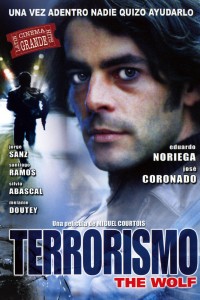by Felipe Bueno | Apr 20, 2016 | events, Feature Stories, Features |
The Center for Peace and Conflict Studies at Seton Hall University held a two-day conference on April 4-5 called “All Conflict is Local: Personal Experience, Reflection, and Conflict Resolution.” This conference was a unique opportunity for students studying conflict and post-conflict reconstruction to present their research to the Seton Hall community.
The conference w as organized by Dr. Zheng Wang, director of the Center for Peace and Conflict Studies, a specialist in global negotiation and conflict management, and an expert on the Asia-Pacific region.
as organized by Dr. Zheng Wang, director of the Center for Peace and Conflict Studies, a specialist in global negotiation and conflict management, and an expert on the Asia-Pacific region.
Dr. Wang was inspired by the Global Conflict Resolution and Peacebuilding course he is teaching this semester, and stressed to the students, “This is your conference.” He emphasized that the conflict is real for many people and there is a value in stories of conflict of those who experienced it.
The first day of presentations began with opening remarks by Dean Andrea Bartoli, who commended Dr. Wang for the creativity of the conference. Four panelists presented their work on the localized conflicts occurring in all parts of Africa. “Conversation is dangerous,” stated Dean Bartoli, “but injustices must be discussed for the sake of the victims to conflict, and for the betterment of society.”
(more…)
by Felipe Bueno | Mar 21, 2016 | Blog, events |
 “El Lobo” is a film that beautifully melds together an artistic visual experience with a complicated, and multifaceted story about nationalism and moral ambiguity . The story involves a man, Txema, who is incredibly passionate towards his homeland – the Basque country – but due to some unforeseen circumstances he ends up being recruited by the Spanish government to infiltrate ETA. In the process he undergoes tribulations that cause him to lose his wife and question what it means to love his country. His journey makes him question exactly how far he is willing to go for his country, and he is ultimately forced to choose between what he believes is the lesser of two evils. On one hand, he must consider helping the nationalist terrorist organization ETA, whose goal is Basque independence, or the Spanish government, who wishes to suppress ETA for their own personal gain.
“El Lobo” is a film that beautifully melds together an artistic visual experience with a complicated, and multifaceted story about nationalism and moral ambiguity . The story involves a man, Txema, who is incredibly passionate towards his homeland – the Basque country – but due to some unforeseen circumstances he ends up being recruited by the Spanish government to infiltrate ETA. In the process he undergoes tribulations that cause him to lose his wife and question what it means to love his country. His journey makes him question exactly how far he is willing to go for his country, and he is ultimately forced to choose between what he believes is the lesser of two evils. On one hand, he must consider helping the nationalist terrorist organization ETA, whose goal is Basque independence, or the Spanish government, who wishes to suppress ETA for their own personal gain.
After being exposed to both sides of this war, Txema decides that the means by which ETA wishes to gain independence are too destructive and chooses to side with the Spanish government. He believes that the government wishes to put an end to the fighting for the good of the people. However, he soon finds out that the government wants to end the fighting only temporarily in order to be looked favorably upon by the international community. At this realization Txema’s world is shattered knowing that he was merely a puppet in a proxy war. After this he is hated by the members of ETA and forced to leave the Basque region, all while being dismissed by the Spanish police force. The movie’s tragic end highlights the futility of the conflict and demonstrates how people’s lives were ruined by violence on both sides.
 as organized by Dr. Zheng Wang, director of the Center for Peace and Conflict Studies, a specialist in global negotiation and conflict management, and an expert on the Asia-Pacific region.
as organized by Dr. Zheng Wang, director of the Center for Peace and Conflict Studies, a specialist in global negotiation and conflict management, and an expert on the Asia-Pacific region.
 “El Lobo” is a film that beautifully melds together an artistic visual experience with a complicated, and multifaceted story about nationalism and moral ambiguity . The story involves a man, Txema, who is incredibly passionate towards his homeland – the Basque country – but due to some unforeseen circumstances he ends up being recruited by the Spanish government to infiltrate ETA. In the process he undergoes tribulations that cause him to lose his wife and question what it means to love his country. His journey makes him question exactly how far he is willing to go for his country, and he is ultimately forced to choose between what he believes is the lesser of two evils. On one hand, he must consider helping the nationalist terrorist organization ETA, whose goal is Basque independence, or the Spanish government, who wishes to suppress ETA for their own personal gain.
“El Lobo” is a film that beautifully melds together an artistic visual experience with a complicated, and multifaceted story about nationalism and moral ambiguity . The story involves a man, Txema, who is incredibly passionate towards his homeland – the Basque country – but due to some unforeseen circumstances he ends up being recruited by the Spanish government to infiltrate ETA. In the process he undergoes tribulations that cause him to lose his wife and question what it means to love his country. His journey makes him question exactly how far he is willing to go for his country, and he is ultimately forced to choose between what he believes is the lesser of two evils. On one hand, he must consider helping the nationalist terrorist organization ETA, whose goal is Basque independence, or the Spanish government, who wishes to suppress ETA for their own personal gain.